Senate votes to allow witnesses in Trump impeachment trial
Five Republican senators join Democrats voting in favor of allowing witnesses; Chad Pergram reports.
The impeachment trial for former President Donald Trump is technically meant to be quasi-judicial. The House impeachment managers are given the chance to make the case that Trump did what they accuse him of in their article of impeachment in both briefs and in person. And Trump's legal team will have the chance to rebut those arguments.
Further, the senators are sworn in ahead of the trial to do "impartial justice" as they sit as essentially jurors.
"Do you solemnly swear that in all things appertaining to the trial of the impeachment of Donald John Trump, former president of the United States, now pending, you'll do impartial justice according to the Constitution and laws, so help you God?" Senate President Pro Tempore Patrick Leahy, D-Vt., asked as he swore in his colleagues.
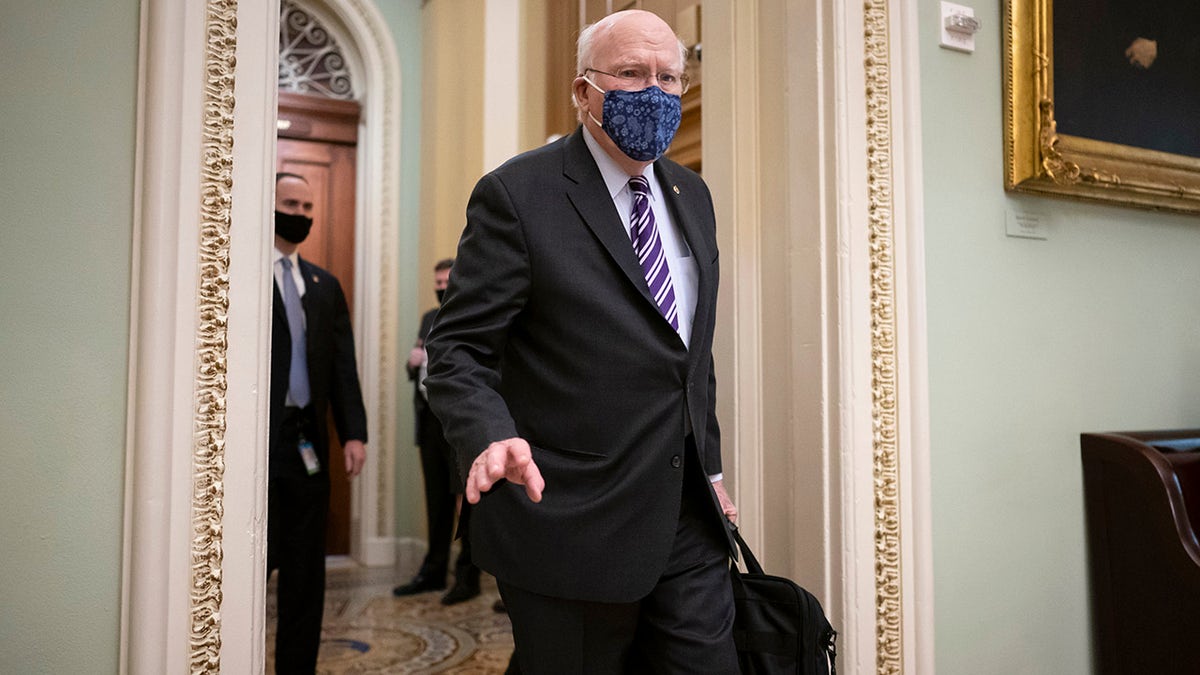
Sen. Patrick Leahy, D-Vt., the president pro tempore of the Senate, arrives at the Capitol in Washington, Tuesday, Jan. 26, 2021. Leahy swore senators in to do "impartial justice" during former President Donald Trump's second impechment trial. (AP Photo/J. Scott Applewhite) (AP)
CAN THE SENATE STOP TRUMP RUNNING FOR PRESIDENT AGAIN?
After both sides are done making their cases, senators will be asked to vote fundamentally on whether Rep. Jamie Raskin, D-Md., and his fellow impeachment managers successfully proved that Trump did what he is accused of in the impeachment article.
Here's a guide to what Trump is accused of in his impeachment trial.
Incitement of insurrection
Incitement of insurrection is the fundamental charge behind the impeachment article. During Trump's previous impeachment, he was accused of two separate things in two separate articles – obstruction of justice and abuse of power.
That led Sen. Mitt Romney, R-Utah, to split his votes, saying that Trump did abuse his power but that the House did not sufficiently prove its accusation that Trump obstructed justice. Romney was the only Republican to vote for either of those articles.
That won't be an option here – there will only be one article to vote on.
Lying about the election results
While there is one fundamental charge in the House impeachment article, the impeachment managers level a number of accusations against the former president to support the charge. Among them is that Trump lied about the results of the presidential election.
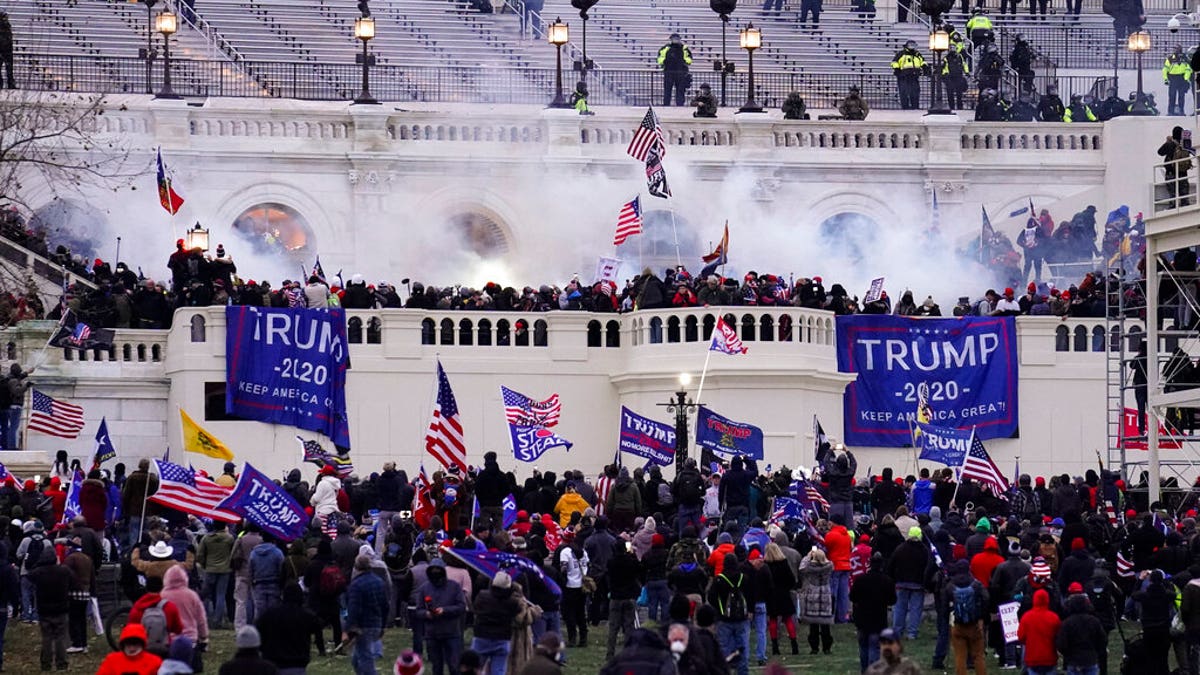
FILE - In this Jan. 6, 2021, file photo violent rioters, loyal to President Donald Trump, storm the Capitol in Washington. The words of Donald Trump supporters who are accused of participating in the deadly U.S. Capitol riot may end up being used against him in his Senate impeachment trial as he faces the charge of inciting a violent insurrection. (AP Photo/John Minchillo, File)
"In the months preceding the joint session, President Trump repeatedly issued false statements asserting that the presidential election results were the product of widespread fraud and should not be accepted by the American people or certified by state or federal officials," the impeachment article said.
In their opening pre-trial brief, the House managers expand on this point and connect it to the events of Jan. 6, in which a pro-Trump mob stormed the Capitol after a Trump rally earlier in the day.
CHENEY EASILY SURVIVES PUSH TO STRIP HER OF HOUSE GOP LEADERSHIP POSITION
"President Trump’s responsibility for the events of Jan. 6 is unmistakable. After losing the 2020 election, President Trump refused to accept the will of the American people. He spent months asserting, without evidence, that he won in a 'landslide' and that the election was 'stolen,'" the brief said. "He amplified these lies at every turn, seeking to convince supporters that they were victims of a massive electoral conspiracy that threatened the nation’s continued existence. But every single court to consider the president’s attacks on the outcome of the election rejected them."
Trump's defense team, Bruce Castor Jr. and David Schoen, denied that Trump lied about the election results in their response to the impeachment article, saying that it was an opinion protected by the First Amendment and that his statements can't be proven false.
"Insufficient evidence exists upon which a reasonable jurist could conclude that the 45th president’s statements were accurate or not, and he, therefore, denies they were false," the brief says.
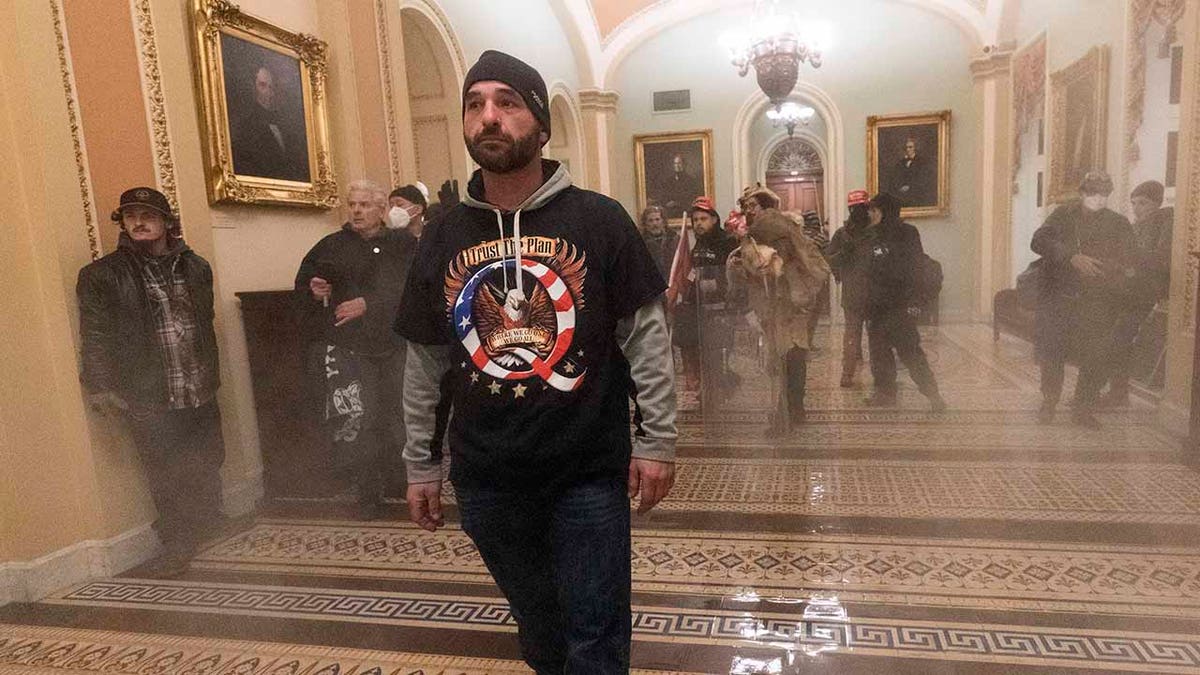
In this Jan. 6, 2021, file photo, smoke fills the walkway outside the Senate Chamber as supporters of President Donald Trump are confronted by U.S. Capitol Police officers inside the Capitol in Washington. Far-right social media users for weeks openly hinted in widely shared posts that chaos would erupt at the U.S. Capitol while Congress convened to certify the election results. (AP Photo/Manuel Balce Ceneta, File)
"To the extent Averment 5 alleges his opinion is factually in error, the 45th president denies this allegation," the Trump brief reads, referencing the House's allegation that Trump at his Jan. 6 rally "reiterated false claims that 'we won this election, and we won it by a landslide.'"
Sending the mob to the Capitol
"He also willfully made statements that, in context, encouraged – and foreseeably resulted in – lawless action at the Capitol, such as: 'if you don’t fight like hell you’re not going to have a country anymore,'" the impeachment article also says of the Jan. 6 "Save America Rally" Trump organized.
"Thus incited by President Trump, members of the crowd he had addressed... unlawfully breached and vandalized the Capitol, injured and killed law enforcement personnel, menaced members of Congress, the vice president, and congressional personnel, and engaged in other violent, deadly, destructive and seditious acts," it continues. The article says the mob aimed to "interfere with the joint session’s solemn constitutional duty to certify the results of the 2020 presidential election."
TRUMP PUSHES POLL SHOWING CHENEY WOUNDED IN WYOMING BY IMPEACHMENT VOTE
The impeachment managers' brief also notes that Trump promised the rally would be "wild" and says rhetoric from Trump and his allies riled up the crowd before instructing them to march to the Capitol.
"Before President Trump took the stage, his lawyer called for 'trial by combat.' His son warned Republican legislators against finalizing the election results: 'We’re coming for you.' Finally, President Trump appeared behind a podium bearing the presidential seal," the brief says.
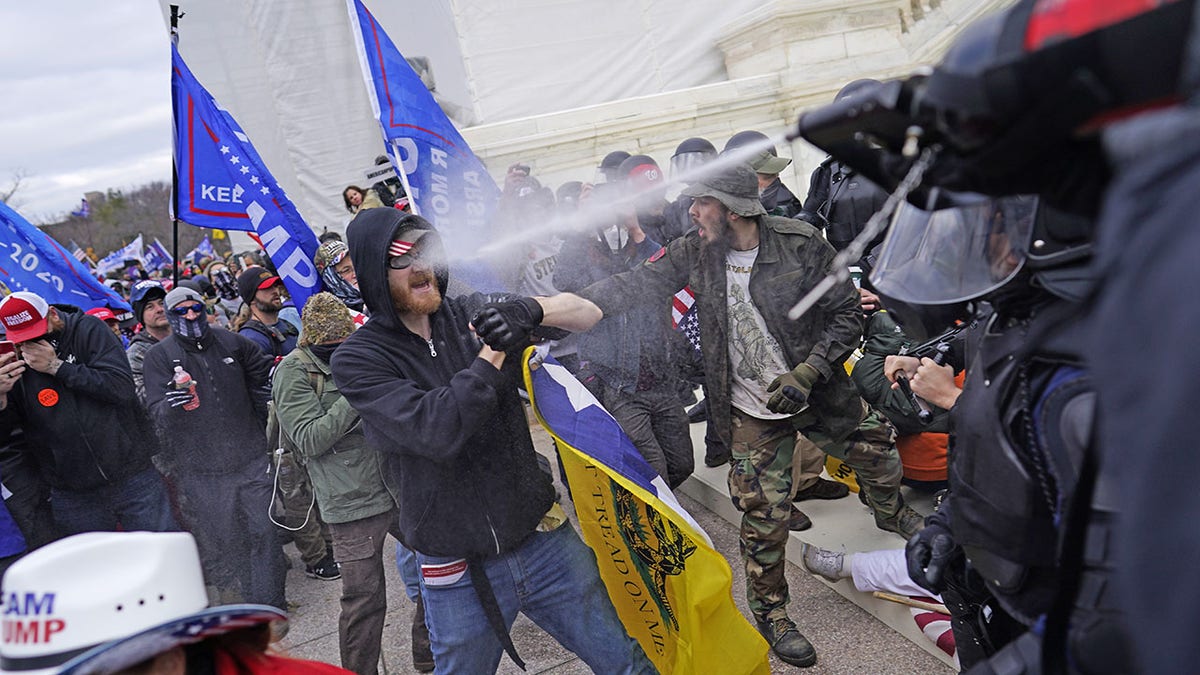
Protesters gather on the second day of pro-Trump events fueled by President Donald Trump's continued claims of election fraud in an to overturn the results before Congress finalizes them in a joint session of the 117th Congress on Wednesday, Jan. 6, 2021 in Washington, DC. (Kent Nishimura / Los Angeles Times via Getty Images)
It continues: "Surveying the tense crowd before him, President Trump whipped it into a frenzy, exhorting followers to 'fight like hell [or] you’re not going to have a country anymore.' Then he aimed them straight at the Capitol, declaring: 'You’ll never take back our country with weakness. You have to show strength, and you have to be strong.'"
The answer from Trump's legal team denies that he incited the crowd, that his statement on fighting "like hell" meant anything about going to the Capitol and that he intended to interfere with the counting of electoral votes.
The fight "like hell" quote, Trump's lawyers said, was "clearly about the need to fight for election security in general, as evidenced by the recording of the speech."
They added that it's "customary" for members of Congress to challenge Electoral College results "to debate whether a state's submitted electoral votes should be counted."
Trump did say that his followers would be "marching over to the Capitol building to peacefully and patriotically make your voices heard," but Democrats have said that on the balance that one mention of peace does not offset the rest of his rhetoric over the course of months.
SENATE REPUBLICANS WILL BE 'VERY UNITED' AGAINST CONVICTING TRUMP AFTER HE LEFT OFFICE: GRAHAM
Trying to subvert the election
The impeachment article also says Trump previously engaged in "efforts to subvert and obstruct the certification of the results of the 2020 presidential election."
This included, it says, a call on which Trump "urged the secretary of state of Georgia, Brad Raffensperger, to 'find' enough votes to overturn the Georgia presidential election results and threatened Secretary Raffensperger if he failed to do so."
The House impeachment managers' brief also levels that Trump "launched a pressure campaign initially aimed at state election officials that soon expanded to the Department of Justice and members of Congress."
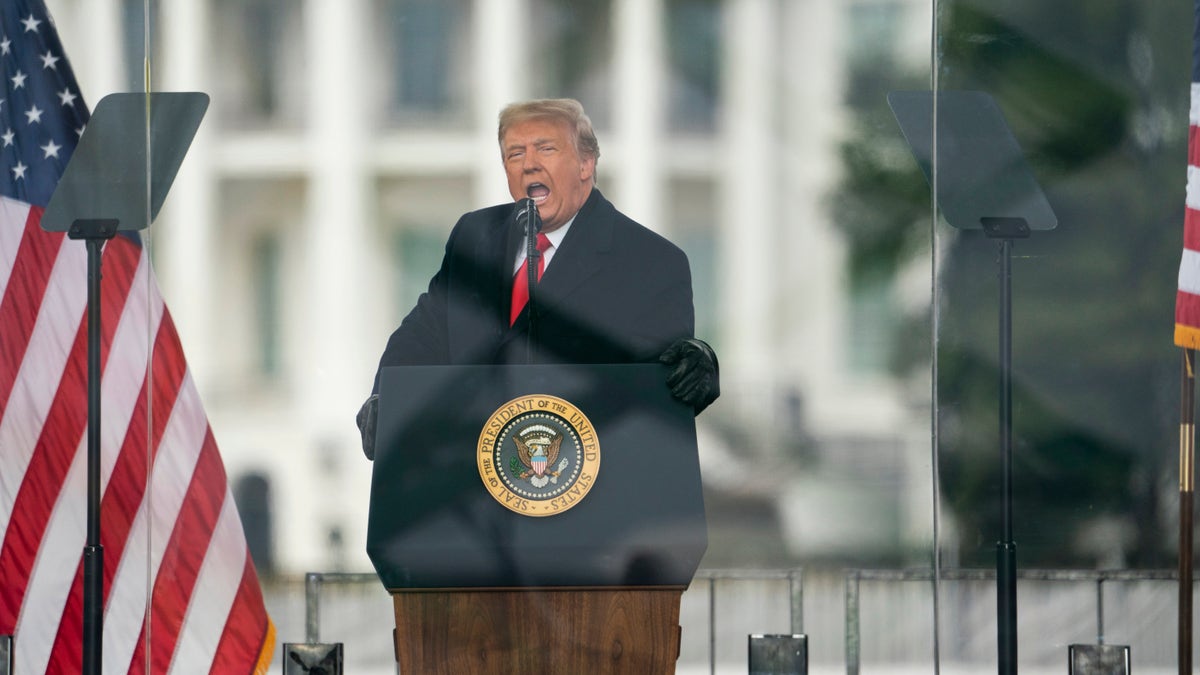
President Donald Trump speaks during a rally protesting the electoral college certification of Joe Biden as President, Wednesday, Jan. 6, 2021, in Washington. (AP Photo/Evan Vucci)
It added: "Trump brought the full power of his office to bear on state officials, pushing them to overturn and block certification of the election results by any means necessary. He pursued this agenda through tweets, phone calls and meetings with officials, seeking at every opportunity to reverse the election so that he could remain in office."
Trump's team says the Democrats are taking his comment to Raffensperger out of context.
"It is denied President Trump made any effort to subvert the certification of the results of the 2020 presidential election. It is denied that the word 'find' was inappropriate in context, as President Trump was expressing his opinion that if the evidence was carefully examined one would 'find that you have many that aren’t even signed and you have many that are forgeries,'" Trump's defense team said.
CLICK HERE TO GET THE FOX NEWS APP
The brief adds: "It is denied that President Trump threatened Secretary Raffensperger. It is denied that President Trump acted improperly in that telephone call in any way."
Outside of the specific accusations against Trump, likely to take up much of the debate at the impeachment trial – which starts Tuesday – is discussion about whether the trial is constitutional.
Trump's defense and many GOP senators say that it is not, and 45 Republicans voted that the is not constitutionally permissible last week. But the impeachment managers say it is, and Senate Majority Leader Chuck Schumer, D-N.Y., cited a bipartisan coalition of legal scholars who back that up.
Convincing Republicans that the trial is legitimate will be step one for the impeachment managers, as it takes a two-thirds vote to convict at an impeachment trial. That would require at least 12 Republicans to change their minds about the trial's legitimacy.






